Related Research Articles
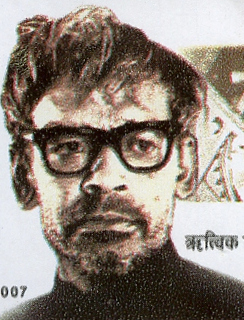
Ritwik Kumar Ghatak was a noted Indian film director, screenwriter, and playwright. Along with prominent contemporary Bengali filmmakers Satyajit Ray, Tapan Sinha and Mrinal Sen, his cinema is primarily remembered for its meticulous depiction of social reality, partition and feminism. He won the National Film Award's Rajat Kamal Award for Best Story in 1974 for his Jukti Takko Aar Gappo and Best Director's Award from Bangladesh Cine Journalist's Association for Titash Ekti Nadir Naam. The Government of India honoured him with the Padma Shri for Arts in 1970.

Meghe Dhaka Tara is a 1960 film written and directed by Ritwik Ghatak, based on a social novel by Shaktipada Rajguru with the same title. It stars Supriya Choudhury, Anil Chatterjee, Gita Dey, Bijon Bhattacharya, Niranjan Roy, and Gyanesh Mukherjee. It was part of a trilogy consisting of Meghe Dhaka Tara (1960), Komal Gandhar (1961), and Subarnarekha (1962), all dealing with the aftermath of the Partition of Bengal during the Partition of India in 1947 and the refugees coping with it.

Madhabi Chakraborty is an Indian actress. She won the National Film Award for Best Actress for her performance in the Bengali film Dibratrir Kabya. She has acted in some of the most critically acclaimed films in Bengali cinema and is considered one of the great actresses of Bengali cinema.

Shankar, is a writer in the Bengali language and the Sheriff of Kolkata. He grew up in Howrah district of West Bengal.
Several fiction, non-fiction and cinemas were based on Kolkata, or depicted Kolkata from certain point of views. Some of such works are listed here.
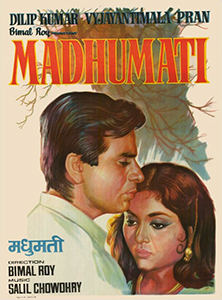
Madhumati is a 1958 Indian Hindi-language paranormal romance film directed and produced by Bimal Roy, and written by Ritwik Ghatak and Rajinder Singh Bedi. The film stars Vyjayanthimala and Dilip Kumar in lead roles, with Pran and Johnny Walker in supporting roles. The plot focuses on Anand, a modern man who falls in love with a tribal woman named Madhumati. But they face challenges in their relationship finally leading to a paranormal consequence. It was ranked 11th in the Outlook Magazine's 25 leading Indian directors' poll for selecting Bollywood's greatest films in 2003.
Parallel cinema, or New Indian Cinema, was a film movement in Indian cinema that originated in the state of West Bengal in the 1950s as an alternative to the mainstream commercial Indian cinema.
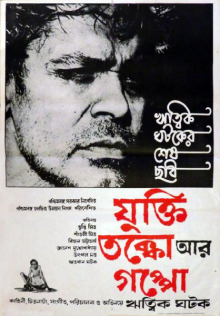
Jukti Takko Aar Gappo is a 1974 Bengali film directed by auteur of Indian cinema Ritwik Ghatak. Jukti Takko Aar Gappo was Ritwik Ghatak's last film. The film was believed to have a cinematography way ahead of its time. The film won National Film Award's Rajat Kamal Award for Best Story in 1974.

Nagarik, also spelled as Nagorik, The Citizen in English, was the first feature-length film directed by legendary Indian director Ritwik Ghatak. Completed in 1952, it preceded Satyajit Ray's Pather Panchali as perhaps the first example of an art film in Bengali cinema, but is deprived of that honor, since it was released twenty-four years later, after Ghatak's death. On 20 September 1977, it finally premiered at the New Empire theatre in Kolkata, India. Ritwik Ghatak directed only eight feature films, but is generally regarded as one of the auteurs of Indian cinema and virtually unsurpassed as a creator of powerful imagery and epic style by directors such as Satyajit Ray and of transcendental power and extraordinariness by critics such as Derek Malcolm.
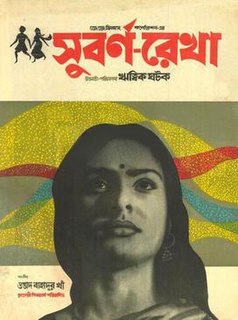
Subarnarekha is an Indian Bengali film directed by Ritwik Ghatak. It was produced in 1962 but not released until 1965. It is a part of the trilogy that includes Meghe Dhaka Tara (1960), Komal Gandhar (1961) and Subarnarekha (1962), all dealing with the aftermath of the Partition of India in 1947 and the refugees coping with it.
Anil Chatterjee (Chattopadhyay) Bengali: অনিল চ্যাটার্জী (চট্টোপাধ্যায়) was an Indian actor in the Bengali cinema during the early fifties through the mid-nineties and is mostly remembered as a character actor. He acted or performed in about 150 movies, including a few in Hindi. He played different shades, though mostly as a character actor, as well as in leading roles and at times as an antagonist, despite the limited opportunities he received. Irrespective of the roles, he left an indelible impression on the viewers and the critics. He also acted in the leading role in a tele-serial named Naqab in the national network of Doordarshan. He is one of the very few selected actors who worked with Satyajit Ray, Ritwik Ghatak, Tapan Sinha and Mrinal Sen; with the first three directors, he performed with on more than a number of occasions. His performance in the title role of the film Deshbandhu Chittaranjan [a biopic on the noted and revered freedom-fighter and barrister Chittaranjan Das (1870–1925), who was conferred the title of "Deshbandhu "] won the appreciation of Basanti Devi, the wife of the "Deshbandhu".
Saswata Chatterjee is an Indian actor of television and films based in Kolkata. Born to actor Subhendu Chatterjee, Saswata Chatterjee began his career with a Hindi serial directed by Saibal Mitra, based on Samaresh Majumdar's Kaalpurush. He gained popularity by portraying the character of Topshe in a Feluda-based television series directed by Sandip Ray. His acting in many Bengali films has been praised by the critics, including his portrayal of a Ritwik Ghatak-inspired character in the 2013 film Meghe Dhaka Tara. He enjoyed success at the national level in Sujoy Ghosh's 2012 blockbuster Hindi film, Kahaani, where he played Bob Biswas, an assassin.

Nabarun Bhattacharya was an Indian writer in Bengali language. He was born at Berhampur, West Bengal. He was the only child of actor and playwright Bijon Bhattacharya and writer, activist Mahashweta Devi. His maternal grandfather was the writer from the Kallol era, Manish Ghatak. Visionary filmmaker Ritwik Ghatak was his great uncle.
Kato Ajanare (1959) is an unfinished Bengali drama film directed by Ritwik Ghatak. The storyline was based on a Bengali novel written by Mani Shankar Mukherjee with the same title. The film was shot on a 20-day schedule. The shooting was complete, except the court scene. The film was discontinued and abandoned for mainly financial and some other problems.
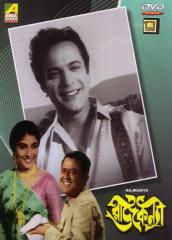
Rajkanya is a 1965 Bengali film directed by Sunil Bandyopadhyay. The movie was based on a story and screenplay by legendary film director Ritwik Ghatak. Uttam Kumar, Rina Ghosh, Bhanu Bandopadhyay, and Tarun Kumar portray the main characters.

Celluloid Man is a 2012 documentary film directed by Shivendra Singh Dungarpur that explores the life and work of legendary Indian archivist P. K. Nair, founder of the National Film Archive of India and guardian of Indian cinema.

Meghe Dhaka Tara is a 2013 Indian Bengali film directed by Kamaleswar Mukherjee and made under Shree Venkatesh Films banners. The film is inspired from the life and works of Bengali film director Ritwik Ghatak. The entire film is in black and white except the last scene which has been shot in colour. In this film Saswata Chatterjee plays the character of Nilkantha Bagchi and Ananya Chatterjee plays the role of Durga, Nilkantha's wife. The film was released on 14 June 2013. Besides giving an account of Ghatak's life, the film also depicts the socio-political environment of contemporary West Bengal during the Tebhaga and Naxalite movements.

Ekti Nadir Naam is a 2003 documentary-style film directed Anup Singh, exploring the life and work of the great Indian filmmaker Ritwik Ghatak and is set in the partition of Bengal in 1947.
Shahnewaz Kakoli is a Bangladeshi film, theatre and telefilm director. She made her debut as a director with the film Uttarer Sur (2012) which was screened in different international film festivals like – Goa International Film Festival, Kolkata International Film Festival (2012), Third Eye Mumbai Film Festival. The film won 3 Bangladesh National Film Awards.
Meghe Dhaka Tara is a 2016 drama directed by Bratya Basu and produced and staged by Naihati Bratyajan. The plot of the drama is based on Ritwik Ghatak's 1960 film Meghe Dhaka Tara.
References
- ↑ Shampa Banerjee (1985). Profiles, five film-makers from India: V. Shantaram, Raj Kapoor, Mrinal Sen, Guru Dutt, Ritwik Ghatak . Directorate of Film Festivals, National Film Development Corp. p. 118. ISBN 978-81-201-0007-7 . Retrieved 13 October 2012.
- 1 2 "Kumari Mon". Gomolo. Retrieved 13 October 2012.
- ↑ Ansu Sur (2005). Eleventh Kolkata Film Festival. Kolkata Film Festival. p. 122. Retrieved 13 October 2012.
- ↑ "Kumari Mon awards". Gomolo. Retrieved 13 October 2012.